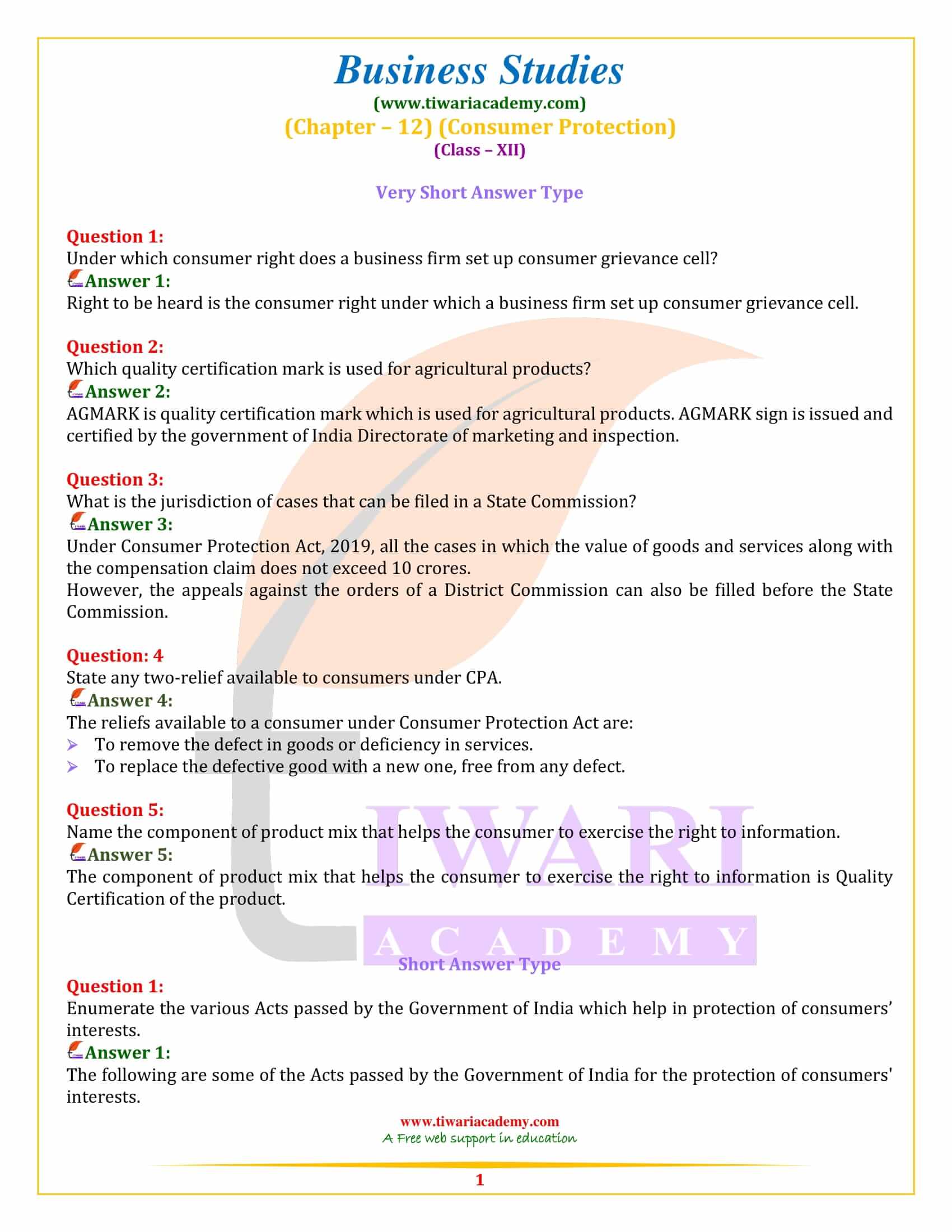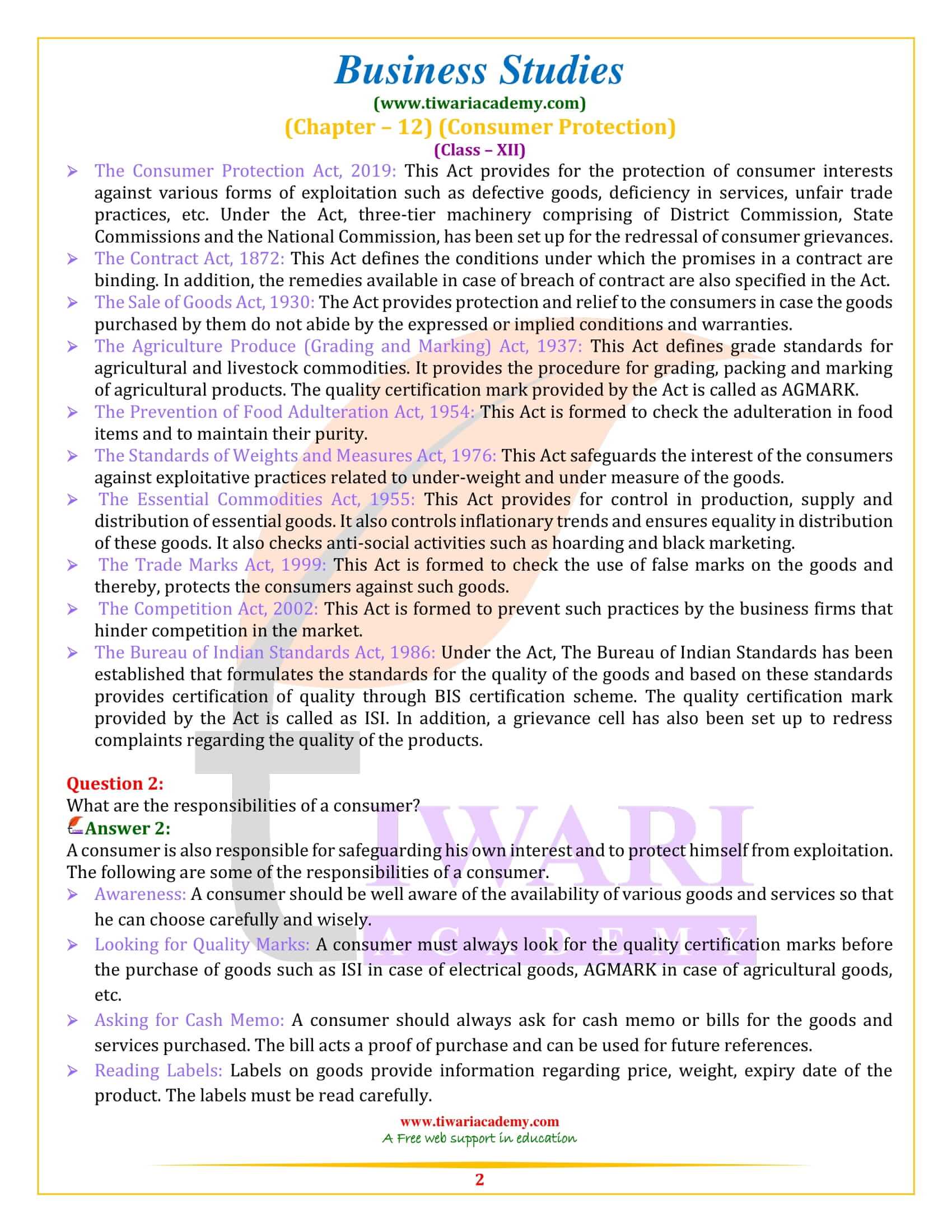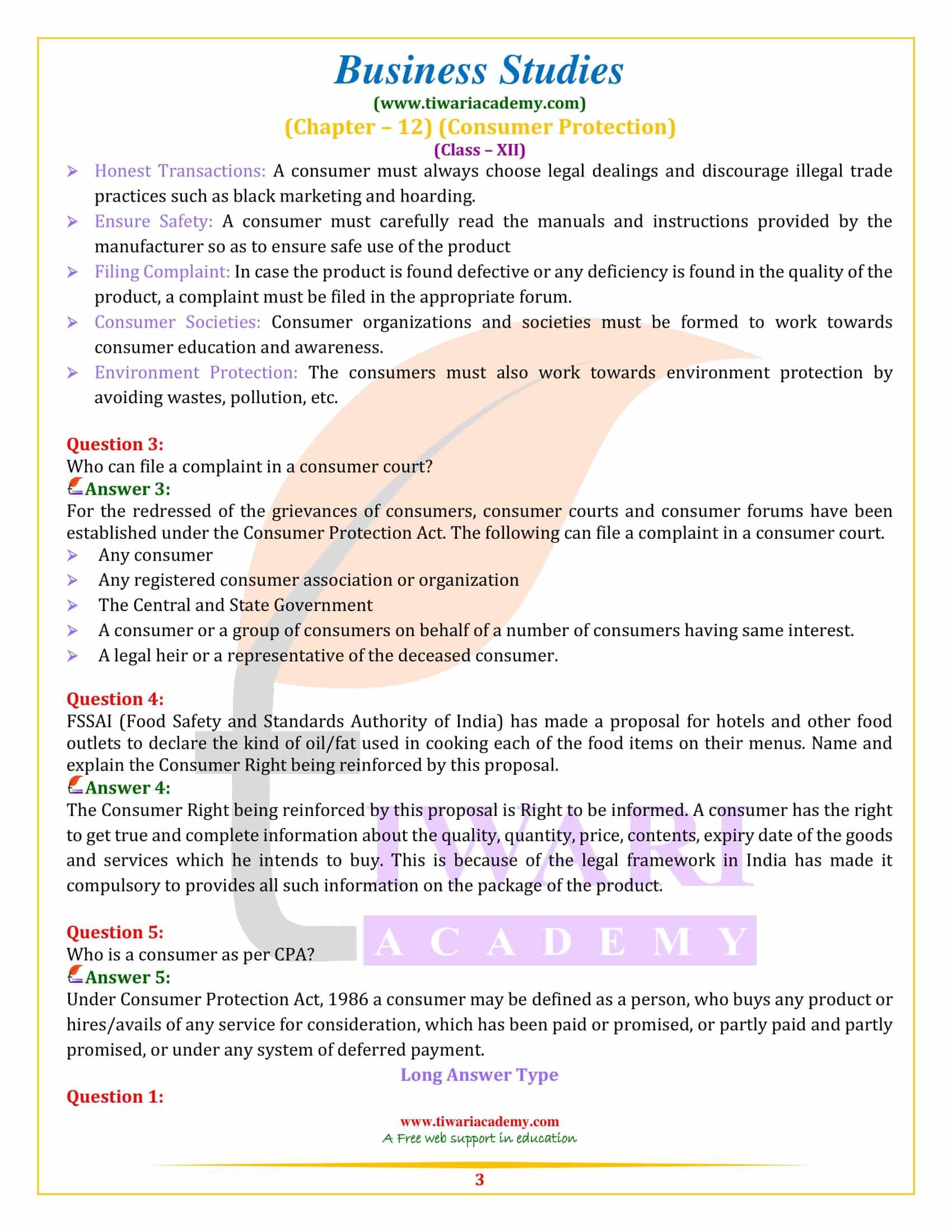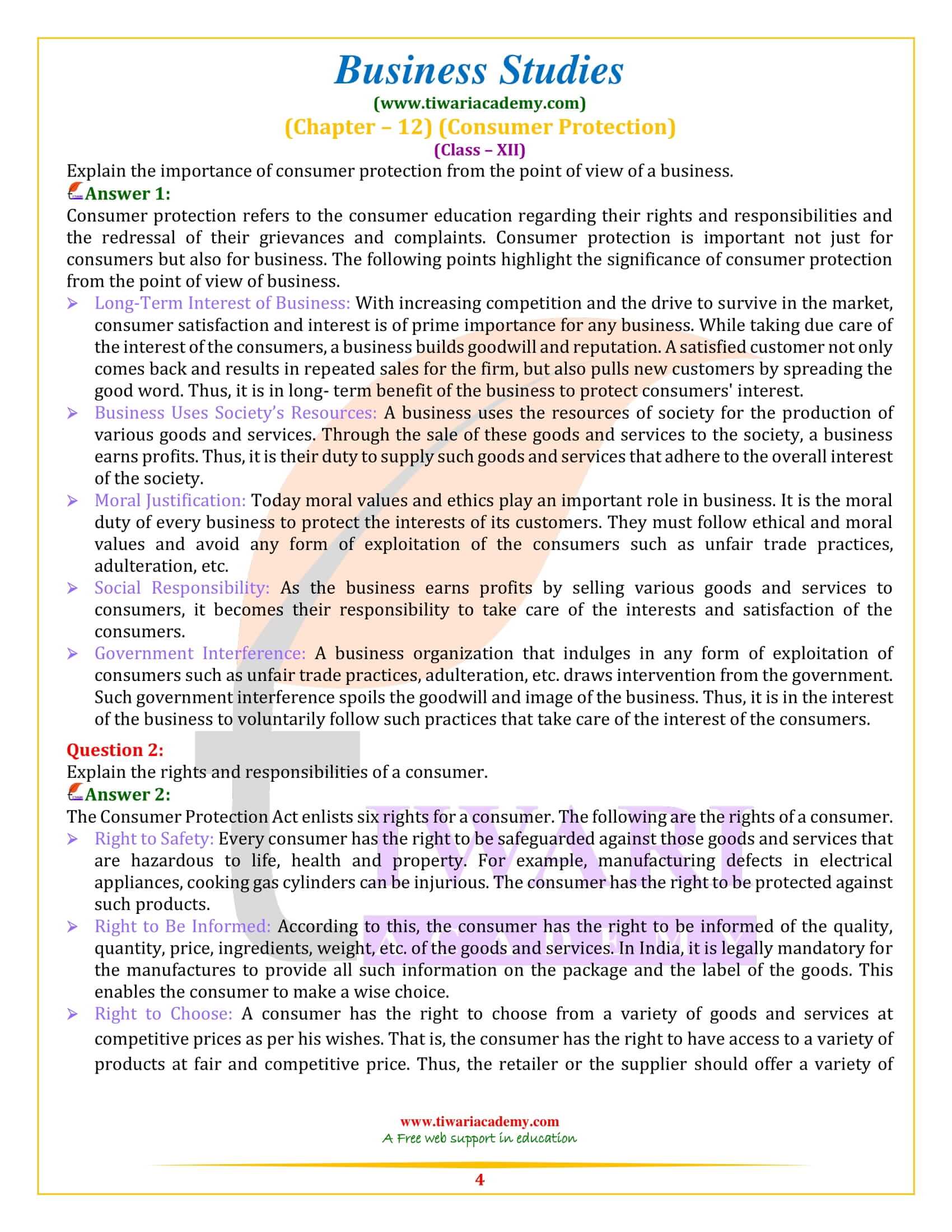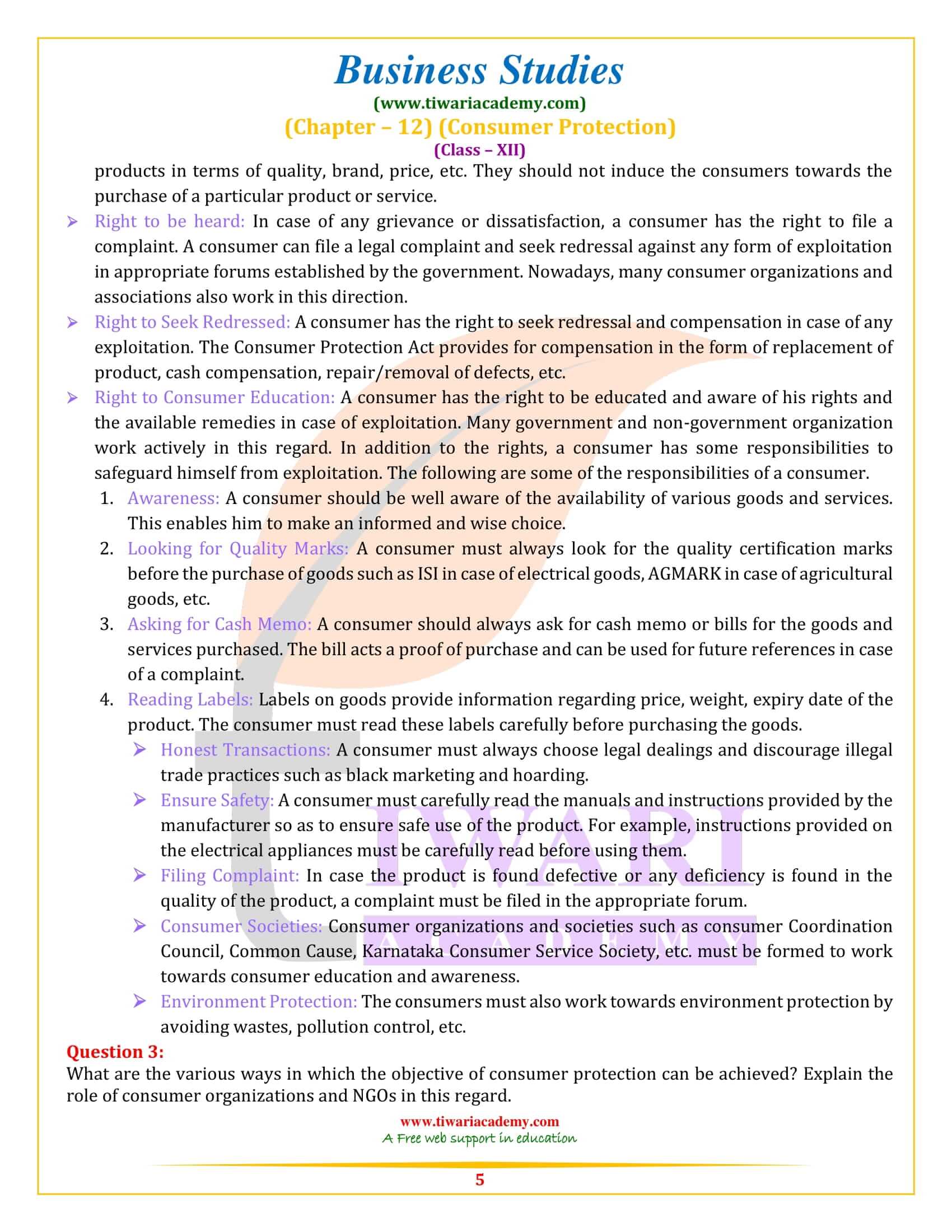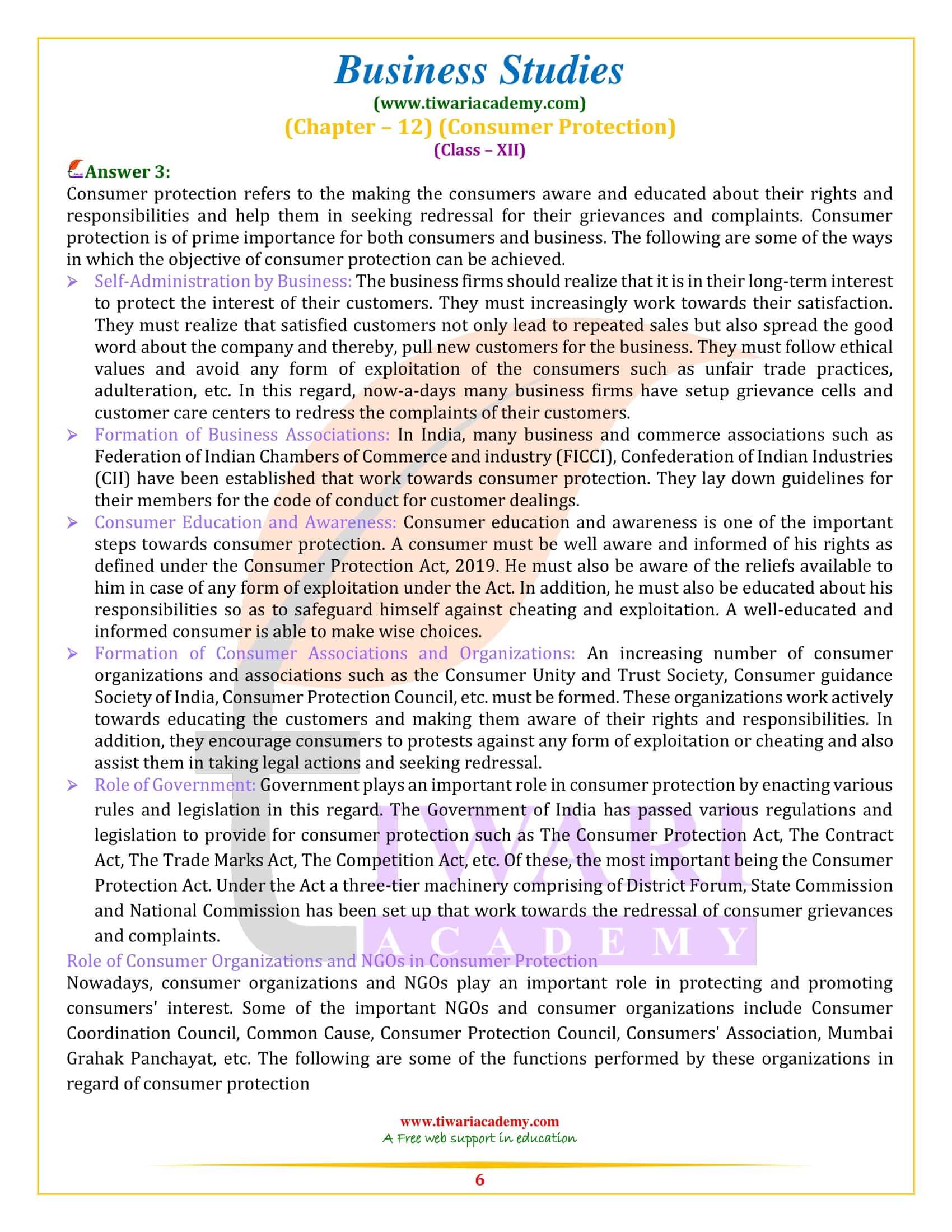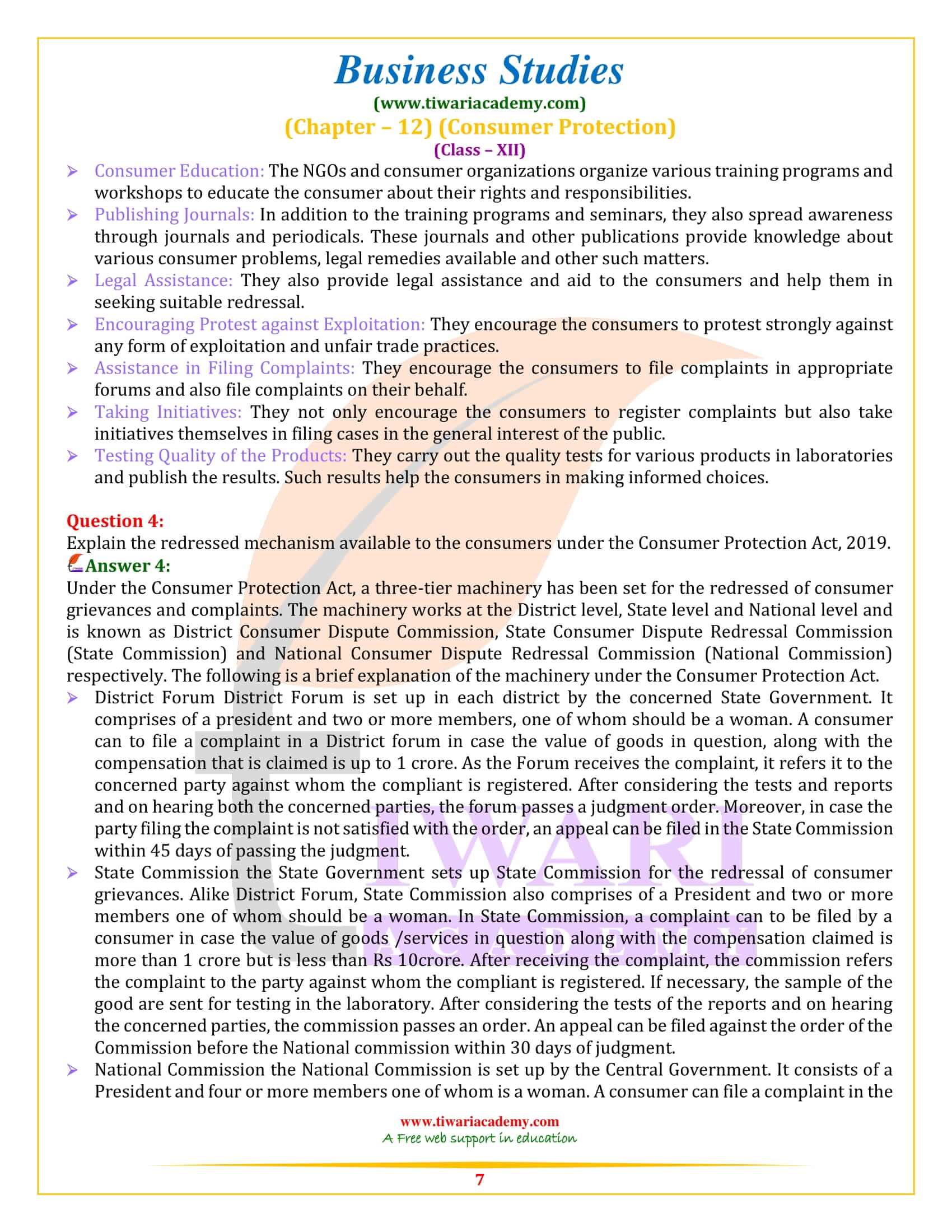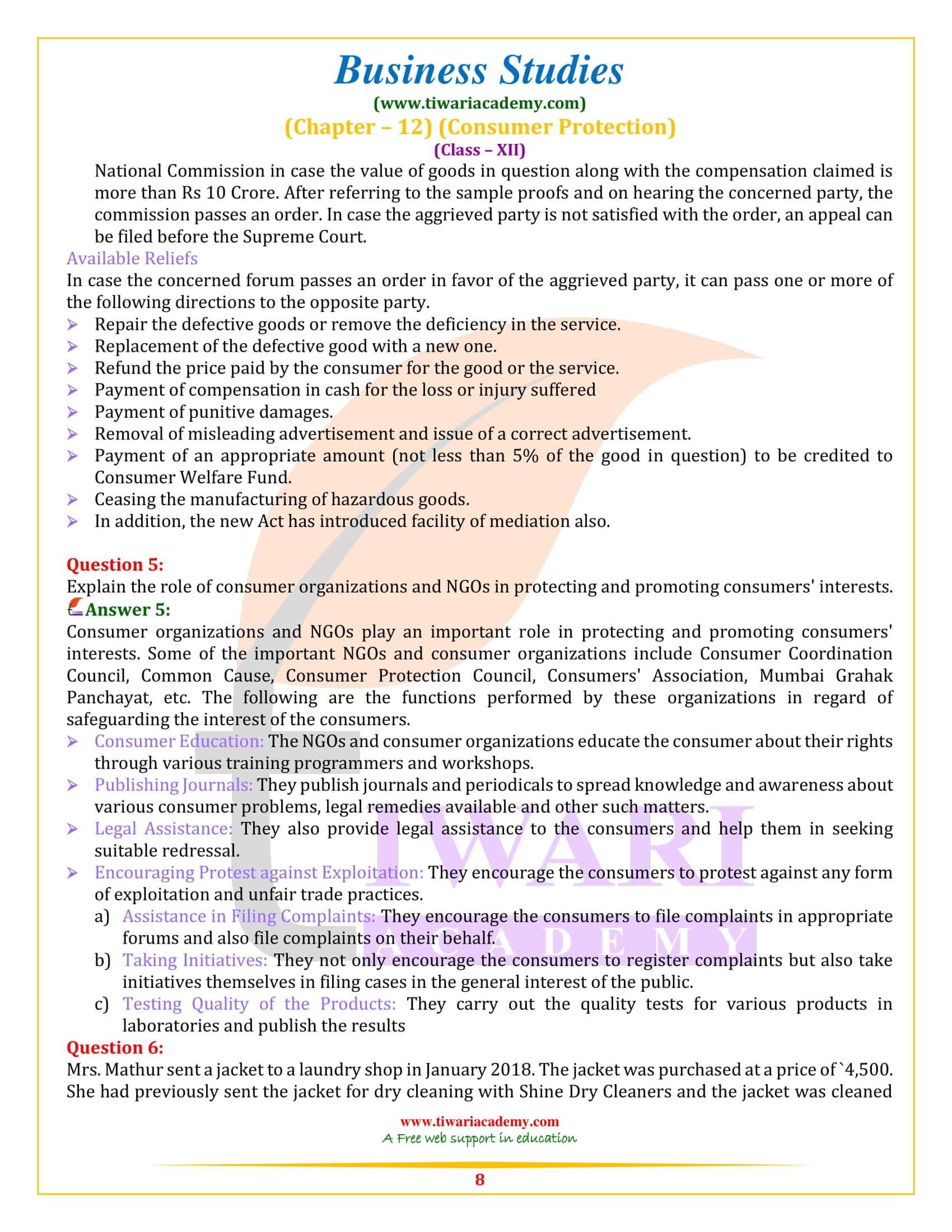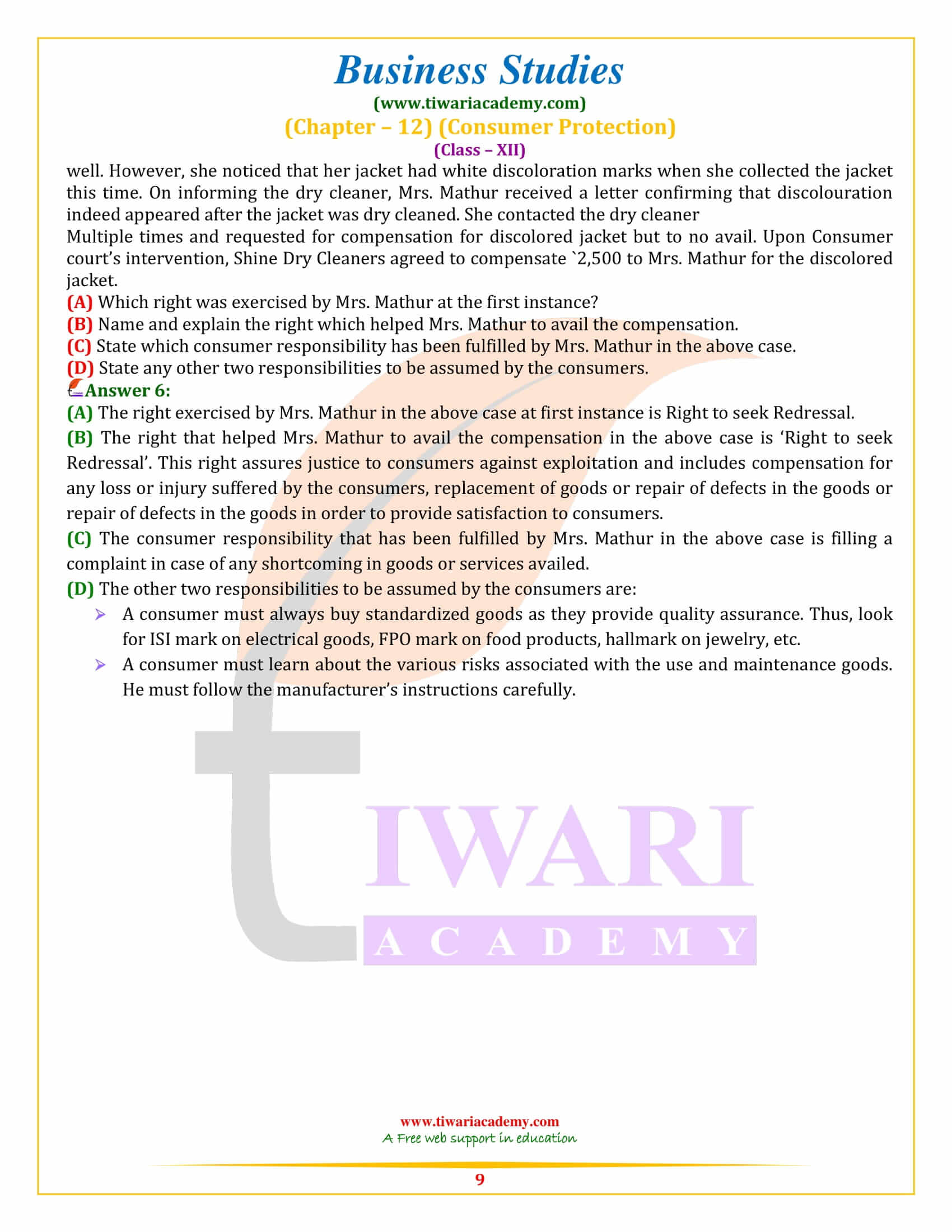NCERT Solutions for Class 12 Business Studies Chapter 12 Consumer Protection updated for new academic session 2025-26. Class 12th B St Solutions are useful for those who are using NCERT Books for this session as a course book.
Viva Question for Class 12 Business Studies
NCERT Solutions for Class 12 Business Studies Chapter 12
Class 12 Business Studies Chapter 12 NCERT Solutions
Very Short Answer Type Questions
Under which consumer right does a business firm set up consumer grievance cell?
Right to be heard is the consumer right under which a business firm set up consumer grievance cell.
Which quality certification mark is used for agricultural products?
AGMARK is quality certification mark which is used for agricultural products. AGMARK sign is issued and certified by the government of India Directorate of marketing and inspection.
What is the jurisdiction of cases that can be filed in a State Commission?
Under Consumer Protection Act, 2019, all the cases in which the value of goods and services along with the compensation claim does not exceed 10 crores.
However, the appeals against the orders of a District Commission can also be filled before the State Commission.
State any two-relief available to consumers under CPA.
The reliefs available to a consumer under Consumer Protection Act are:
- To remove the defect in goods or deficiency in services.
- To replace the defective good with a new one, free from any defect.
Name the component of product mix that helps the consumer to exercise the right to information.
The component of product mix that helps the consumer to exercise the right to information is Quality Certification of the product.
Short Answer Type Questions
Enumerate the various Acts passed by the Government of India which help in protection of consumers’ interests.
Answer 1:
The following are some of the Acts passed by the Government of India for the protection of consumers’ interests.
The Consumer Protection Act, 2019: This Act provides for the protection of consumer interests against various forms of exploitation such as defective goods, deficiency in services, unfair trade practices, etc. Under the Act, three-tier machinery comprising of District Commission, State Commissions and the National Commission, has been set up for the redressal of consumer grievances.
The Contract Act, 1872: This Act defines the conditions under which the promises in a contract are binding. In addition, the remedies available in case of breach of contract are also specified in the Act.
The Sale of Goods Act, 1930: The Act provides protection and relief to the consumers in case the goods purchased by them do not abide by the expressed or implied conditions and warranties.
The Agriculture Produce (Grading and Marking) Act, 1937: This Act defines grade standards for agricultural and livestock commodities. It provides the procedure for grading, packing and marking of agricultural products. The quality certification mark provided by the Act is called as AGMARK.
The Prevention of Food Adulteration Act, 1954: This Act is formed to check the adulteration in food items and to maintain their purity.
The Standards of Weights and Measures Act, 1976: This Act safeguards the interest of the consumers against exploitative practices related to under-weight and under measure of the goods.
The Essential Commodities Act, 1955: This Act provides for control in production, supply and distribution of essential goods. It also controls inflationary trends and ensures equality in distribution of these goods. It also checks anti-social activities such as hoarding and black marketing.
The Trade Marks Act, 1999: This Act is formed to check the use of false marks on the goods and thereby, protects the consumers against such goods.
The Competition Act, 2002: This Act is formed to prevent such practices by the business firms that hinder competition in the market.
The Bureau of Indian Standards Act, 1986: Under the Act, The Bureau of Indian Standards has been established that formulates the standards for the quality of the goods and based on these standards provides certification of quality through BIS certification scheme. The quality certification mark provided by the Act is called as ISI. In addition, a grievance cell has also been set up to redress complaints regarding the quality of the products.
What are the responsibilities of a consumer?
A consumer is also responsible for safeguarding his own interest and to protect himself from exploitation. The following are some of the responsibilities of a consumer.
- Awareness: A consumer should be well aware of the availability of various goods and services so that he can choose carefully and wisely.
- Looking for Quality Marks: A consumer must always look for the quality certification marks before the purchase of goods such as ISI in case of electrical goods, AGMARK in case of agricultural goods, etc.
- Asking for Cash Memo: A consumer should always ask for cash memo or bills for the goods and services purchased. The bill acts a proof of purchase and can be used for future references.
- Reading Labels: Labels on goods provide information regarding price, weight, expiry date of the product. The labels must be read carefully.
- Honest Transactions: A consumer must always choose legal dealings and discourage illegal trade practices such as black marketing and hoarding.
- Ensure Safety: A consumer must carefully read the manuals and instructions provided by the manufacturer so as to ensure safe use of the product
- Filing Complaint: In case the product is found defective or any deficiency is found in the quality of the product, a complaint must be filed in the appropriate forum.
- Consumer Societies: Consumer organizations and societies must be formed to work towards consumer education and awareness.
- Environment Protection: The consumers must also work towards environment protection by avoiding wastes, pollution, etc.
Who can file a complaint in a consumer court?
For the redressed of the grievances of consumers, consumer courts and consumer forums have been established under the Consumer Protection Act. The following can file a complaint in a consumer court:
- Any consumer.
- Any registered consumer association or organization.
- The Central and State Government.
- A consumer or a group of consumers on behalf of a number of consumers having same interest.
- A legal heir or a representative of the deceased consumer.
FSSAI (Food Safety and Standards Authority of India) has made a proposal for hotels and other food outlets to declare the kind of oil/fat used in cooking each of the food items on their menus. Name and explain the Consumer Right being reinforced by this proposal.
The Consumer Right being reinforced by this proposal is Right to be informed. A consumer has the right to get true and complete information about the quality, quantity, price, contents, expiry date of the goods and services which he intends to buy. This is because of the legal framework in India has made it compulsory to provides all such information on the package of the product.
Who is a consumer as per CPA?
Under Consumer Protection Act, 1986 a consumer may be defined as a person, who buys any product or hires/avails of any service for consideration, which has been paid or promised, or partly paid and partly promised, or under any system of deferred payment.
Long Answer Type Questions
Explain the importance of consumer protection from the point of view of a business.
Consumer protection refers to the consumer education regarding their rights and responsibilities and the redressal of their grievances and complaints. Consumer protection is important not just for consumers but also for business. The following points highlight the significance of consumer protection from the point of view of business.
Long-Term Interest of Business: With increasing competition and the drive to survive in the market, consumer satisfaction and interest is of prime importance for any business. While taking due care of the interest of the consumers, a business builds goodwill and reputation. A satisfied customer not only comes back and results in repeated sales for the firm, but also pulls new customers by spreading the good word. Thus, it is in long- term benefit of the business to protect consumers’ interest.
Business Uses Society’s Resources: A business uses the resources of society for the production of various goods and services. Through the sale of these goods and services to the society, a business earns profits. Thus, it is their duty to supply such goods and services that adhere to the overall interest of the society.
Moral Justification: Today moral values and ethics play an important role in business. It is the moral duty of every business to protect the interests of its customers. They must follow ethical and moral values and avoid any form of exploitation of the consumers such as unfair trade practices, adulteration, etc.
Social Responsibility: As the business earns profits by selling various goods and services to consumers, it becomes their responsibility to take care of the interests and satisfaction of the consumers.
Government Interference: A business organization that indulges in any form of exploitation of consumers such as unfair trade practices, adulteration, etc. draws intervention from the government. Such government interference spoils the goodwill and image of the business. Thus, it is in the interest of the business to voluntarily follow such practices that take care of the interest of the consumers.
Explain the rights and responsibilities of a consumer.
The Consumer Protection Act enlists six rights for a consumer. The following are the rights of a consumer.
Right to Safety: Every consumer has the right to be safeguarded against those goods and services that are hazardous to life, health and property. For example, manufacturing defects in electrical appliances, cooking gas cylinders can be injurious. The consumer has the right to be protected against such products.
Right to Be Informed: According to this, the consumer has the right to be informed of the quality, quantity, price, ingredients, weight, etc. of the goods and services. In India, it is legally mandatory for the manufactures to provide all such information on the package and the label of the goods. This enables the consumer to make a wise choice.
Right to Choose: A consumer has the right to choose from a variety of goods and services at competitive prices as per his wishes. That is, the consumer has the right to have access to a variety of products at fair and competitive price. Thus, the retailer or the supplier should offer a variety of products in terms of quality, brand, price, etc. They should not induce the consumers towards the purchase of a particular product or service.
Right to be heard: In case of any grievance or dissatisfaction, a consumer has the right to file a complaint. A consumer can file a legal complaint and seek redressal against any form of exploitation in appropriate forums established by the government. Nowadays, many consumer organizations and associations also work in this direction.
Right to Seek Redressed: A consumer has the right to seek redressal and compensation in case of any exploitation. The Consumer Protection Act provides for compensation in the form of replacement of product, cash compensation, repair/removal of defects, etc.
Right to Consumer Education: A consumer has the right to be educated and aware of his rights and the available remedies in case of exploitation. Many government and non-government organization work actively in this regard. In addition to the rights, a consumer has some responsibilities to safeguard himself from exploitation. The following are some of the responsibilities of a consumer.
1. Awareness: A consumer should be well aware of the availability of various goods and services. This enables him to make an informed and wise choice.
2. Looking for Quality Marks: A consumer must always look for the quality certification marks before the purchase of goods such as ISI in case of electrical goods, AGMARK in case of agricultural goods, etc.
3. Asking for Cash Memo: A consumer should always ask for cash memo or bills for the goods and services purchased. The bill acts a proof of purchase and can be used for future references in case of a complaint.
4. Reading Labels: Labels on goods provide information regarding price, weight, expiry date of the product. The consumer must read these labels carefully before purchasing the goods.
Honest Transactions: A consumer must always choose legal dealings and discourage illegal trade practices such as black marketing and hoarding.
Ensure Safety: A consumer must carefully read the manuals and instructions provided by the manufacturer so as to ensure safe use of the product. For example, instructions provided on the electrical appliances must be carefully read before using them.
Filing Complaint: In case the product is found defective or any deficiency is found in the quality of the product, a complaint must be filed in the appropriate forum.
Consumer Societies: Consumer organizations and societies such as consumer Coordination Council, Common Cause, Karnataka Consumer Service Society, etc. must be formed to work towards consumer education and awareness.
Environment Protection: The consumers must also work towards environment protection by avoiding wastes, pollution control, etc.
FAQs
Is chapter 12 of class 12 Business Studies having practical utility?
This chapter along with the topic business environment are the two most important chapters. Reason being – each one of us is a consumer. Therefore, all of us should know our rights and responsibilities as well.
What changes have occurred in recent past in class 12 Business Studies chapter 12?
The Consumer Protection Act, 1986 has been replaced by the Consumer Protection Act, 2019. The financial limits of the three levels of Consumer Courts has changed. Further, the facility regarding mediation between the complainant (consumer) and the seller has been introduced.
What are the important questions in chapter 12 in Class 12 Business Studies?
The importance of Consumer Protection from the point of view of consumer, the business and the society. Besides, the rights of consumers, remedies available must be studied thoroughly.
What is so special about the Consumer Protection Act, 2019 in 12th Business Studies chapter 12?
According to this Act, there is no requirement of a lawyer to represent the consumer. Secondly, this Act does not apply to a person who purchases goods for commercial use.
